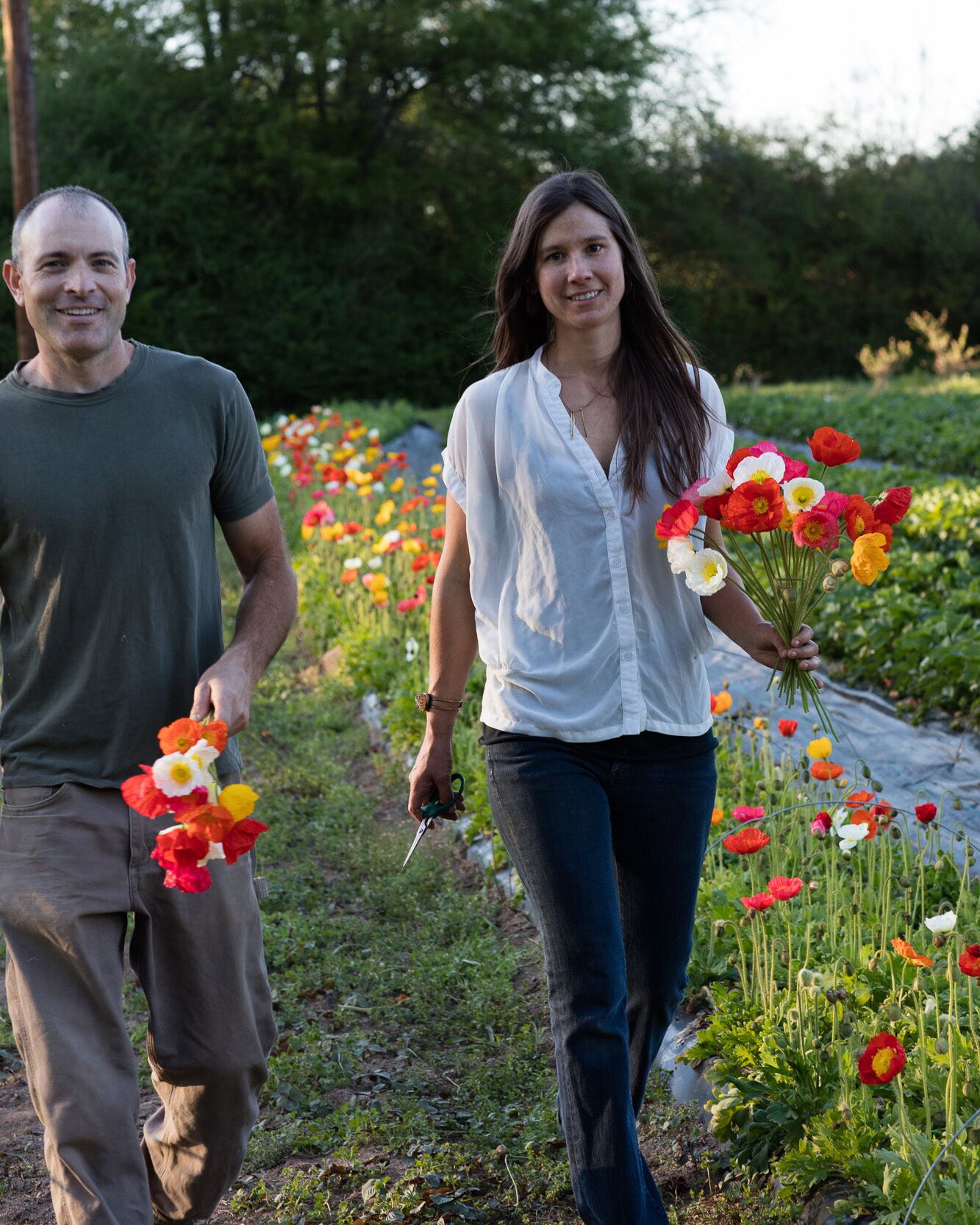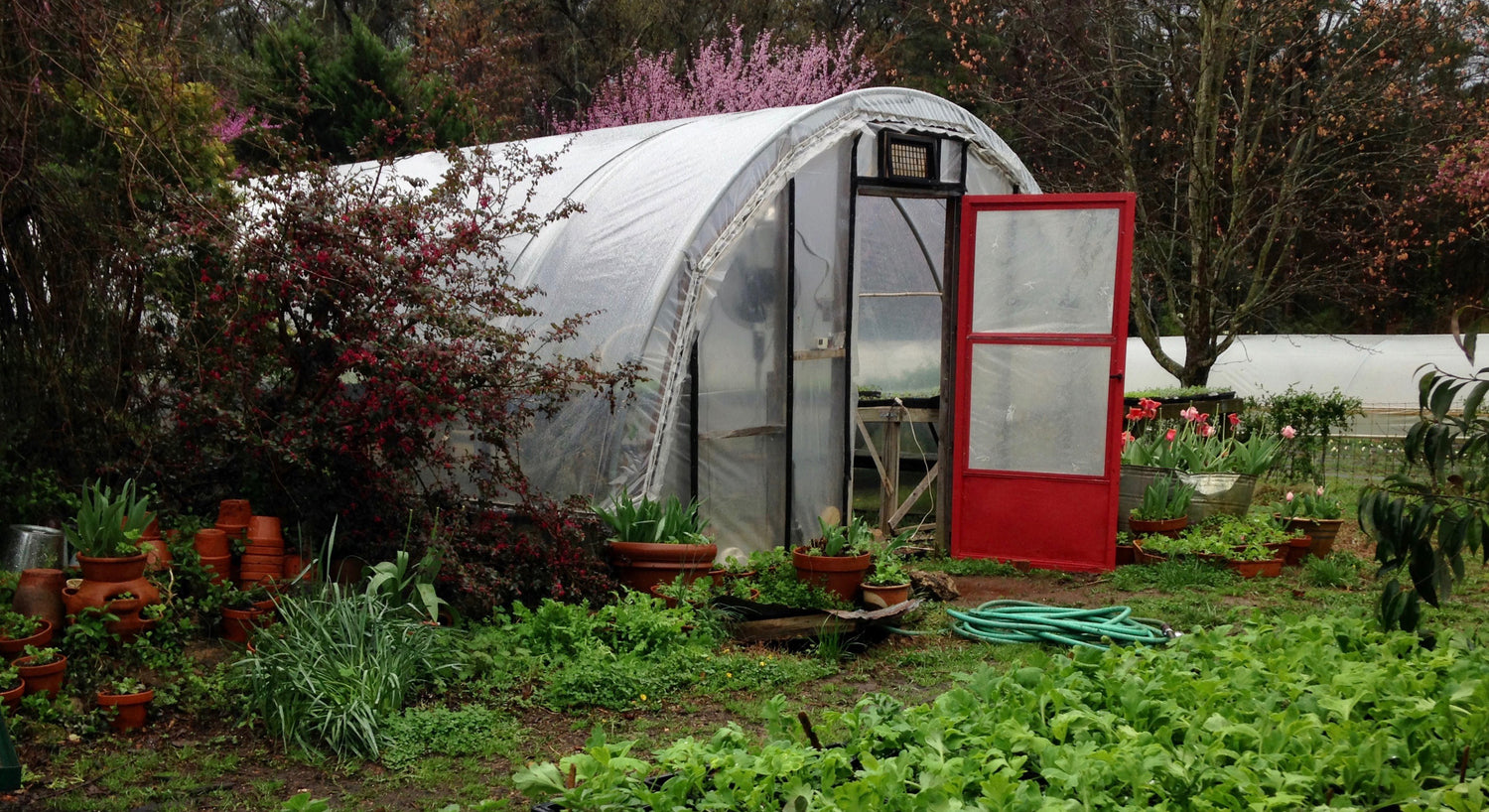Like many flower fans, I first found 3 Porch Farm—a fruit and flower farm in North Georgia run by husband-and-wife team Steve and Mandy O'Shea—via their stunning Instagram feed. Accompanying photos of the gorgeous, naturally-grown flowers the O'Sheas raise on their 9-acres are captions full of warmth and humor, practical advice on growing flowers and running a business, and glimpses into the ups and downs of life on the farm. Between flooding polytunnels, golf cart breakdowns, and hawks hunting the guineas, there's never a dull moment.
Steve and Mandy's is an agricultural love story. They met in Mandy's home state of Georgia, but it wasn't until a few years later—(literally) 2 days into a road trip to California—that the two fell in love. They decided then and there to merge Mandy's horticultural background with Steve's passion for sustainability and renewable energy and build a life together. 3 Porch Farm, which is entirely solar-powered, and where the farm vehicles are bio-fueled, is the impressive result. They also run a floral design studio, Moonflower, using botanicals they've grown or foraged to create naturalistic arrangements. As the growing season kicks into gear, we checked in with Steve on the farm, only to find out that he and Mandy have been prepping for spring since last October!

WHEN DOES YOUR SPRING SEASON START IN EARNEST, AND WHAT EXACTLY DOES THAT LOOK LIKE?
It's fair to say our spring season starts in earnest in October. We do take off a little time for the holidays, and I'll occasionally do a silent retreat in the winter, but aside from that, Mandy and I tend to work 7 days a week in the winter in preparation for spring. The lion's share of our spring plantings happen in October through December, and there's a constant flow of energy and work being done until spring sales start in earnest....which would be the beginning of March. That's when the whirlwind of markets, wholesale deliveries, and weddings start back up and the rhythm of harvest, process, market, and sell begins again.
As far as seeds started for our own production, a lot of our spring crops come from tubers and corms, but we also sew and grow larkspur, agrostemma, nigella, Queen Anne's lace, bachelor buttons, snapdragons, poppies etc. Mandy does spend a chunk of the winter starting countless seed trays to sell at our annual plant sale at the end of March. We grow every vegetable start you can think of for Georgia, along with tons of varieties of specialty flowers so people can start their own gardens.
FOR MANY HOME GARDENERS, STARTING SEEDS INSIDE CAN SOUND DAUNTING. WHAT'S THE BENEFIT OF TAKING THE EXTRA TROUBLE?
Controlling the climate is the main benefit to starting seeds inside. Germination rates are a lot higher when temperature is controlled, as well as frost protection on young starts. Seedlings often benefit from a slow introduction to the sun too, in order to harden them off, so they don't get sun-burnt, stressed or killed.
DO YOU SUCCESSION PLANT (SEED THE SAME PLANT AT INTERVALS SO BLOOM TIMES ARE STAGGERED THROUGHOUT THE GROWING SEASON)?
We do tend to succession plant many crops. Whether or not we do it with a certain crop really depends on the window of time that a flower can bloom in our climate without undue stress from pest or temperature extremes. We've got two successions of ranunculus growing right now. Some are blooming and others are just a few inches tall. When the first ones tire out and succumb to disease, or just stop producing beautiful flowers, our hope is that the second succession will start coming on strong. In the summer, we've done as many as three successions of zinnias. The first succession usually keeps producing for a long time, but the quality of the plants and flowers really diminishes as the summer's fungal pathogens gain a stronger foothold on the plants each week.
As a market farm, it becomes necessary to succession plant so that you have a fairly steady stream of healthy and beautiful flowers to sell every week. If you have a ton of flowers one week and nothing the next, you aren't sending an encouraging message to potential customers that they can rely on you to provide what they want and need. It wouldn't be as necessary for a home gardener who isn't cutting every blooming stem from each plant and doesn't need perfect health and a reliable vase life from every flower. Sometimes its just nice to observe the natural progression of things in the garden, even to the point of decay. A garden, as opposed to a farm, allows more space for unattached observation of natural cycles and rhythms. There is less need for attempts at control and intervention. In addition to harvesting its treats, it can provide endless entertainment and education. It's a wonderful gift to the gardener.
WHAT ARE A FEW OF YOUR MUST-GROW FLOWERS?
For ease of growing and that sweet wild-flower look, we'd recommend poppies, lunaria, purple carrot, foxglove, nicotiana and zinnias (Oklahoma series).


